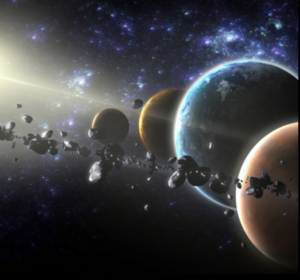PLANETARY SCIENCE, 2022
An intermediate-level course.
Wednesdays via Zoom, 7 PM EDT/EST Oct. 26; Nov. 2, 9, 16, 30; Dec. 7, 14. [No class Nov. 23.]
Note: 7 sessions. However, tuition remains $75 for AAA members.
Not a member? Go to aaa.org, click “Join & Support” button.


Born of chaos and collision. New star surrounded by its protoplanetary disc.
We begin with the physics and parameters underlying the orbits of planets around any star. Then we examine parameters that determine the major characteristics of a planet followed by a tour of Solar System planets. What processes occur during the formation of a planet and once it has formed that differentiate and set its features? We end with the on-going search for exoplanets around stars and considerations about alien life on them. Latest Gaia satellite and James Webb telescope findings are infused.
Instructors: David Kiefer teaches astronomy at Brooklyn College and is Chair of the AAA Classes Committee. Matthias Schmidt is an Astronomy Park Ranger and Night Sky tour leader in Utah, taught our Astronomy 101/102 and Stellarium classes, and written for Eyepiece. Both have Master degrees in Astronomy from the Center for Astrophysics and Supercomputing, Swinburne University, Australia.

October 26- Mechanics of the Solar System
Distance measurements in AU and ly.
Kepler’s Laws.
Newton’s Law of Gravity. Newtonian form of Kepler’s Laws and of “g”. Derived equations.
The 6 orbital parameters of celestial mechanics. PE and KE in obits, Vis Viva equation. The early 1800 physics debates on momentum vs. energy.
November 2 and 9- Key Physical Features of Planets
Orbits: major axis, period, speed, eccentricity. Mass, diameter, & how determined. Density, escape velocity.
Rotation, shape. Surface temperature, solar constant, insolation. Internal sources of heat.
Magnetic field, gravity at surface. Tilt of axis, seasons, inclination.
Surface composition, albedo, tectonics. Linkages between features.
Most features of any planet ultimately derive from nine distinct factors.
November 16 – Whirlwind tour of Solar System
Essentials of the sun and all stars. Inventory: major and dwarf planets, asteroids, comets, meteors, Kuiper belt, Ort cloud. Overview of the 8 major planets. Mysteries, oddities to be resolved. Debate: what is a major planet?
November 30- Formation processes
Star and planet formation overview, evidences. Viral theorem.
SNDM nebular hypothesis: accretion –> planetesimal –> planet embryo –> planet
Conservation of angular momentum. Planet formation via gravity and collisions. Organization into a system.
Terrestrial and gaseous planets. Planet migration. Moons and rings. Roche limits, 1/d3 tidal force.
December 7- Post-formation processes
Planetary differentiation- gravitational, chemical. Heat sources for re-melting. Formation of an atmosphere.
Solar constant and insolation value. Methods of heat transfer.
Chemical evolution. Surface changes. Plate tectonics.
December 14- The Search for Exoplanets and Alien Life
Drake’s equation- a checklist for astronomy and astrobiology research
Radial velocity and transit methods for detecting exoplanets. Other methods- e.g., gravitational lensing
Results so far. Newest data from Webb and Gaia satellites.




